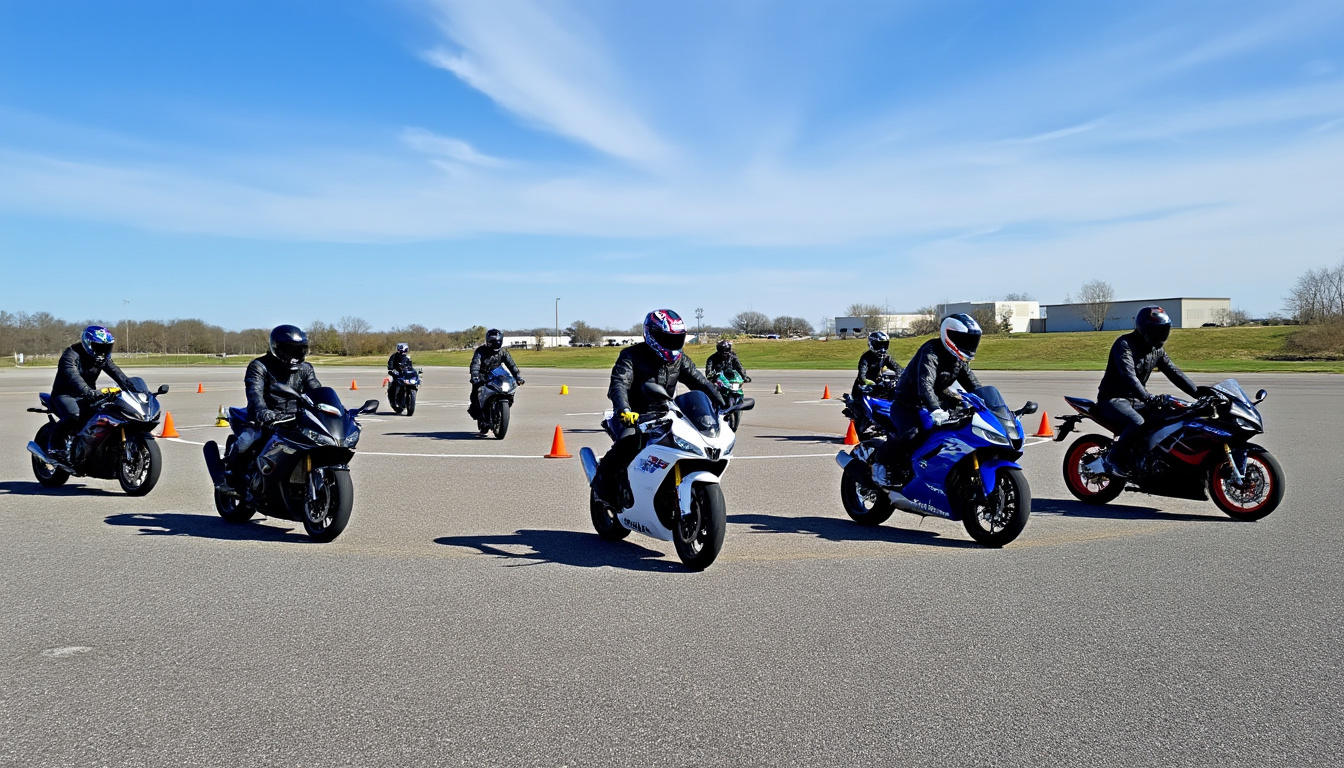The motorcycle industry encourages bikers to take training courses

In a context where road safety concerns are becoming increasingly pressing, the motorcycle sector is firmly committed to encouraging all riders, whether beginners or experienced, to undergo training. These initiatives aim to improve control of two-wheelers and reduce accidents on the roads of Europe. This article presents the various stakeholders involved, the types of training offered, and the crucial importance of this ongoing education for motorcyclists.
Importance of Training for Motorcyclists
Safety on a motorcycle is an issue that cannot be overlooked. Unfortunately, statistics regularly report accidents involving motorcyclists. According to ACEM (European Motorcycle Manufacturers Association), the aim of training is primarily to reduce these incidents on the roads. It is proven that a well-trained motorcyclist is a safer motorcyclist.
In 2025, road safety has taken on an even greater dimension, with an objective to reduce accidents by 2030, as outlined in several European strategies. Thus, training not only allows for acquiring the necessary skills to ride safely but also helps develop appropriate reflexes in dangerous situations. This is where various programs come into play.
The Different Types of Training Offered
There is a multitude of training programs aimed at improving motorcyclists' skills. Here is an overview:
- Post-License Training: These courses are aimed at drivers who have already obtained their license. The focus is on mastering the vehicle and understanding traffic conditions.
- Advanced Training Courses: For experienced motorcyclists, these courses allow riders to refresh their knowledge on advanced driving techniques and emergency situation management.
- Motorcycling School: These institutions offer structured education and often include a combination of theory and practice for new motorcyclists.
- Specialized Training: Aimed at specific practices such as circuit riding or off-road, they help diversify the motorcyclist's skills.
These training programs are often provided by professionals, experienced motorcyclists, or volunteers from associations such as AFDM (Association for Motorcycle Training), which has received a European quality label for its training. This attests that the courses offered meet rigorous safety and effectiveness criteria.

The Stakeholders in Motorcycle Training
Different stakeholders are involved in this field to promote and deliver these trainings. Among them are:
- ACEM: As a manufacturers' association, their role is to highlight the importance of educating motorcyclists.
- FIM: The International Motorcycling Federation is a key partner in implementing awareness campaigns such as "Learn - Ride - Enjoy - Repeat".
- AFDM: The Association for Motorcycle Training is one of the pioneers in initiating and advancing motorcyclists' training in France.
Each of these organizations participates in disseminating ideas and best practices aimed at improving the safety of two-wheeled vehicle users. This also shows how collaboration between various stakeholders is crucial to raise awareness of motorcycle safety.
The Benefits of Ongoing Training
Engaging in additional training presents numerous advantages not only for the motorcyclist but also for other road users. Indeed, the benefits include:
- Improvement of Technical Skills: Motorcyclists learn to manage their vehicle more effectively, which can help avoid dangerous situations.
- Increased Knowledge of Legislation: Training often includes up-to-date information on current regulations, helping motorcyclists stay informed and comply with the law.
- Reduction of Stress and Anxiety: Knowing one's vehicle and having driving techniques for emergencies helps one feel more confident.
These elements highlight the fact that a good initial training, followed by ongoing education, is essential for safe motorcycle practice.
The New Initiatives and Awareness Campaigns
With the aim of reinforcing these trainings and improving safety, several initiatives have recently emerged. Organizations such as ACEM and FIM maintain an active dialogue on the crucial importance of road safety awareness for motorcyclists. This has led to the "Learn - Ride - Enjoy - Repeat" campaign, which encourages motorcyclists to undergo training regularly.
This campaign aims to encourage motorcyclists to participate in various training courses, regardless of their level. The principles are simple: learn new skills, enjoy riding while being safe. The goal stated by Antonio Perlot, the Secretary General of ACEM, demonstrates a willingness to improve road safety in Europe. This collaborative approach between the different actors in the industry is part of a positive dynamic for motorcycling.
The Impact of These Campaigns
The implementation of such campaigns has significant repercussions. Here are some concrete examples:
- Increase in Enrollment in Training Programs: Awareness events have shown a growing interest in courses, with a reported 30% increase in registrations in 2025 compared to previous years.
- Improvement of Motorcyclists' Attitudes: Studies have indicated that motorcyclists who have undergone training are more likely to adopt responsible behaviors on the road.
- Strong Partnerships: The campaign has facilitated the creation of links between different organizations, thus facilitating the sharing of resources and expertise.
A Call to Action for Motorcyclists
Motorcyclists are encouraged to view ongoing training as an opportunity for learning rather than an obligation. This shift in perception is essential to emphasize the importance of regular training. The motorcycle sector thus calls on all users to enhance their skills through initiatives such as those offered by Motorcycle Schools, Biker's Training, and the Riders Academy. These platforms specialize in driver education focused on motorcycle safety.
The Role of Motorcycles and Training in Road Safety
Motorcycles play an important role in the transportation landscape, offering independence and pleasure to millions of enthusiasts. However, this form of mobility also presents unique challenges in terms of safety. The diversity of models and types of motorcycles requires specific expertise to ensure safe riding.
Training thus plays a significant role in this equation, enabling motorcyclists to acquire skills suited to their needs and their motorcycle. Moreover, in 2025, the focus on the environment has also led to a growing interest in electric motorcycles, adding an extra dimension to motorcyclist education.
The New Challenges of Road Safety
The challenges of road safety are constantly evolving. In 2025, motorcyclists must face several challenges, including:
- Increase in Urban Traffic: Dense traffic requires heightened anticipation skills to avoid dangers.
- Autonomous Vehicles: The emergence of autonomous vehicles changes traffic dynamics, making specific training even more relevant.
- Weather-Related Risks: Extreme weather events make riding more perilous and demand adapted techniques.
| Challenge | Implication for Training |
|---|---|
| Increase in Traffic | Need for training focused on anticipating the behaviors of other users |
| Autonomous Vehicles | Need to understand interactions with these new types of vehicles |
| Weather Conditions | Training must include techniques suitable for adverse situations |
Therefore, motorcycle safety depends on quality training and continuous adaptation to new road realities. Every motorcyclist has the responsibility to commit to improving their skills, thus contributing to collective safety on the roads.
The Future Perspectives for Motorcycle Training
By 2025, training for motorcyclists is expected to evolve to better adapt to the new challenges of road safety. Advanced technologies, such as augmented reality applications, could be integrated into training programs for interactive and engaging learning experiences. Likewise, the evolution of vehicles and road infrastructures raises the question of the adequacy of the training offered.
Investments in this sector are also essential. The motorcycle industry, in collaboration with government authorities, must continue to fund and support training initiatives, making quality courses accessible to all. The establishment of subsidies for young motorcyclists or those in career transition could stimulate engagement for road safety.
A Culture of Road Safety
Establishing a true culture of road safety is a challenge that requires the involvement of all stakeholders. Awareness campaigns must resonate through digital channels as well as beyond, in local communities. Everyone must be an ambassador for safety, and this starts by encouraging those around them to participate in training.
Concrete and measurable results should thus guide future strategies. Collaboration among all stakeholders — motorcyclists, educators, manufacturers, and policymakers — is fundamental to building a safer road environment in Europe.
In summary, the motorcycle sector proactively encourages all motorcyclists to view training not only as a mandatory step in obtaining the license but as a long-term personal commitment to road safety.
Source: www.lerepairedesmotards.com
Leave a Reply


Articles relatifs